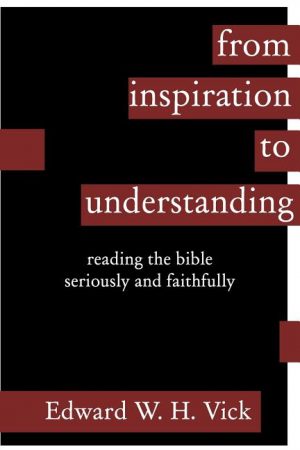Why I Don’t Argue for Inerrancy – Too Much
by Elgin Hushbeck
I believe the Bible to be the inerrant word of God. While I believe the Bible to be inerrant, rarely do I argue for inerrancy. First off, let me briefly explain what I mean by the Bible is the inerrant word of God. While it is possible to be much more explicit, basically I believe that the Bible as written by the Apostles and Prophets is correct in all that the authors intended it to say. (Those wishing a more in-depth discussion should google The Chicago Statement on Biblical Inerrancy, or get Norman Geisler’s excellent book, Inerrancy).
Note that this brief definition avoids all of the problems of textual issues, translations, and interpretation and in fact most of the issues that are behind a lot of disagreements we have as Christians. This is in fact part of the reason I do not argue for Inerrancy, though my main reasons fall into two categories, one for non-Christians and one for Christians.
Why I don’t argue inerrancy with non-Christians.
For Non-Christians, this is pretty straight forward and easy. It is pointless, I don’t need to, and in fact it only makes things harder. Inerrancy is a theological doctrine, grounded on many beliefs, some of which are an integral part of being a Christian. For example, a key underpinning for inerrancy is the belief in the existence of God. Thus how can one argue for inerrancy with an atheist?
More importantly, when dealing with non-Christians, inerrancy is not required. That one does not need to accept inerrancy is amply demonstrated by those Christians who reject the doctrine. Thus for me, why would I want to put a potential stumbling block in the path of someone who needs Christ?
Not only is it not required it makes things harder. Even when I was an atheist I never bought the argument that if there is even one error in the Bible the entire book should be tossed out. Apply that rule universally, we would not have any books. When I claim inerrancy, I take on an impossible burden of proof. How could I ever demonstrate that there was not even a single error in any of the books? I couldn’t.
Instead of taking on this impossible burden, when dealing with non-believers I discuss reliability, not inerrancy. If the Bible is reliable when it talks about the life, ministry, death and resurrection of Jesus, and the implications of this in our lives, what else do I need? Showing the Bible is reliable is actually fairly straight forward, and it is the critics who have to come up with special rules and exceptions so as to avoid conclusions they do not wish to reach. (See my books, Evidence for the Bible, and Christianity and Secularism) Finally, when you get right down to it, the problem of conversion is not a rational problem of arguments and evidence. It is a spiritual problem of the heart.
Why I don’t argue inerrancy with Christians.
While the above reasons are valid when talking with non-Christians, they don’t apply, or apply only secondarily with other Christians. With other Christians my reasons for not arguing inerrancy center around relevance. In short inerrancy simply does not come up that often. As I stated above, a key feature of the definition of inerrancy is that it avoids all the problems of textual issues, translations, and interpretation. While that is good for the doctrine of inerrancy, it does not help when settling other doctrinal disagreements and it is just a fact that there are doctrinal disagreements even among those who those hold to inerrancy. Thus inerrancy is usually the last place I go when attempting to resolve doctrinal disputes.
In addition, Inerrancy is not a clear teaching of scripture in the sense that there is a passage that says: the Bible is inerrant. While I believe there is a solid scriptural basis, there remain a few steps of faith and issues of interpretation, and so I can see where rational people could reach a different conclusion.
So does all this mean that I think the doctrine is unimportant? Not at all. But I think there is a deeper issue here: How do we see ourselves in relation to God’s word. Do we sit in judgment of God’s word or does God’s word sit in judgment of us?
There are those verses in the Bible that I wish were not there; verses that do not conform to my understanding of the way I think things should be. It would be far easier to say, “that apostle didn’t know any better,” or “that prophet made a mistake,” so I could simply ignore the passage. A key “disadvantage” of inerrancy is that this is not an option. On the other hand, there are a lot of people who profess inerrancy and yet avoid all such troublesome issues simply because they do not read the Bible in the first place.
Instead I must wrestle with the text, digging deeper, trying to understand the background and the setting, trying to figure out why God would say such a thing. Most of all, I must pray for understanding, seeking the guidance of the Holy Spirit. Granted, this is no guarantee. At the end of the process it is still not hard to find ways to ignore troublesome and difficult passages. The line between being a judge of the text, and being judged by the text is often quite fine, and I do not make any claims of perfection in this area.
So even though I believe in the doctrine of inerrancy, I rarely argue for it. Instead, I argue that we place ourselves under, not over, the word of God. That we wrestle with those passages that we find difficult, and that by doing so we let the Holy Spirit transform our lives.
-
 Product on saleFrom Inspiration to UnderstandingPrice range: $24.99 through $29.99
Product on saleFrom Inspiration to UnderstandingPrice range: $24.99 through $29.99 -
 InspirationPrice range: $19.49 through $39.99
InspirationPrice range: $19.49 through $39.99







You are a breath of fresh air, Elgin! Thank you for this post. You are right up there along with Josh McDowell and Lee Strobel.
I like your ending words, ” … I argue that we place ourselves under, not over, the word of God. That we wrestle with those passages that we find difficult, and that by doing so we let the Holy Spirit transform our lives.”
God bless you,
Nancy
Nancy,
Thank you for your kind words.